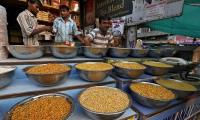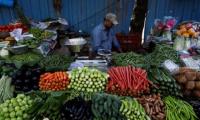RBI: Food Price Moderation in August, Concerns Remain
The Reserve Bank of India (RBI) reports a decrease in cereal, pulse, and edible oil prices in August. However, the article highlights concerns about food inflation persistence and its potential impact on overall inflation.
Mumbai, Aug 19 (PTI) A broad-based moderation was observed in prices of cereals, pulses and edible oil in August, according to an article on 'State of the Economy' in the latest RBI Bulletin released on Monday.
Headline inflation, measured by year-on-year changes in the all-India Consumer Price Index (CPI), moderated sharply to 3.5 per cent in July 2024 from 5.1 per cent in June 2024.
The 154 bps fall in inflation was on account of a favourable base effect of 2.9 per cent, which more than offset a positive momentum of 1.4 per cent, according to the article published in the Reserve Bank's August Bulletin.
"High-frequency food price data for August so far (up to 12th) show that the price of cereals, pulses and edible oil recorded a broad-based moderation," the article, authored by a team led by Reserve Bank Deputy Governor Michael Debabrata Patra, said.
Among key vegetables, potato prices continued to edge up, while onion and tomato prices declined, it added.
Another article in the Bulletin on 'Are Food Prices Spilling Over?' noted that the core inflation had been declining since 2022-23, mainly driven by monetary policy actions and stance and the waning of cost-push shocks.
However, food price shocks have been imposing upside pressures on core inflation throughout these years, but this has been offset by disinflationary monetary policy.
Should this disinflationary force recede, upward pressures on core and headline inflation could get magnified and may run out of control, especially with aggregate demand picking up alongside cost-push risks looming in the wake of geo-political tensions, the article authored by Patra, Joice John and Asish Thomas George said.
Going forward, therefore, if food price pressures persist and continue to spill over, a cautious monetary policy approach is warranted, it noted.
"The conventional treatment of food price perturbations as transitory in the setting of monetary policy is increasingly becoming untenable. A large part of this increase in persistence is driven by the secular upward drift in food inflation expectations. Past high food inflation episodes 'intrinsic persistence' have a bearing in shaping these expectations," it said.
The inelasticity of the demand for food to price shocks makes food inflation persistence all the more worrying, it said, adding that with spillovers to costs, service charges and output prices, the danger of food inflation surfacing as a more generalised phenomenon has increased.
Under these circumstances, it said, the sources of food price shocks may lie outside the realm of monetary policy but when they result in food inflation acquiring persistence and spilling over into other components of inflation and into consumer behaviour, monetary policy must be disinflationary to quell these price pressures to achieve its mandate of price stability and thereby retain credibility.
The central bank, however, added that the views expressed in the Bulletin articles are of the authors and do not represent the views of the Reserve Bank of India.
Headline inflation, measured by year-on-year changes in the all-India Consumer Price Index (CPI), moderated sharply to 3.5 per cent in July 2024 from 5.1 per cent in June 2024.
The 154 bps fall in inflation was on account of a favourable base effect of 2.9 per cent, which more than offset a positive momentum of 1.4 per cent, according to the article published in the Reserve Bank's August Bulletin.
"High-frequency food price data for August so far (up to 12th) show that the price of cereals, pulses and edible oil recorded a broad-based moderation," the article, authored by a team led by Reserve Bank Deputy Governor Michael Debabrata Patra, said.
Among key vegetables, potato prices continued to edge up, while onion and tomato prices declined, it added.
Another article in the Bulletin on 'Are Food Prices Spilling Over?' noted that the core inflation had been declining since 2022-23, mainly driven by monetary policy actions and stance and the waning of cost-push shocks.
However, food price shocks have been imposing upside pressures on core inflation throughout these years, but this has been offset by disinflationary monetary policy.
Should this disinflationary force recede, upward pressures on core and headline inflation could get magnified and may run out of control, especially with aggregate demand picking up alongside cost-push risks looming in the wake of geo-political tensions, the article authored by Patra, Joice John and Asish Thomas George said.
Going forward, therefore, if food price pressures persist and continue to spill over, a cautious monetary policy approach is warranted, it noted.
"The conventional treatment of food price perturbations as transitory in the setting of monetary policy is increasingly becoming untenable. A large part of this increase in persistence is driven by the secular upward drift in food inflation expectations. Past high food inflation episodes 'intrinsic persistence' have a bearing in shaping these expectations," it said.
The inelasticity of the demand for food to price shocks makes food inflation persistence all the more worrying, it said, adding that with spillovers to costs, service charges and output prices, the danger of food inflation surfacing as a more generalised phenomenon has increased.
Under these circumstances, it said, the sources of food price shocks may lie outside the realm of monetary policy but when they result in food inflation acquiring persistence and spilling over into other components of inflation and into consumer behaviour, monetary policy must be disinflationary to quell these price pressures to achieve its mandate of price stability and thereby retain credibility.
The central bank, however, added that the views expressed in the Bulletin articles are of the authors and do not represent the views of the Reserve Bank of India.
You May Like To Read
TODAY'S MOST TRADED COMPANIES
- Company Name
- Price
- Volume
- Vodafone Idea L
- 8.23 (+ 1.60)
- 120450353
- Standard Capital
- 0.55 (+ 3.77)
- 26234194
- AvanceTechnologies
- 0.64 (+ 18.52)
- 15503509
- G G Engineering
- 0.97 (+ 7.78)
- 14312441
- Sharp Investments
- 1.14 (+ 20.00)
- 10870953







 © 2025 Rediff.com India Limited. All rights reserved.
© 2025 Rediff.com India Limited. All rights reserved.